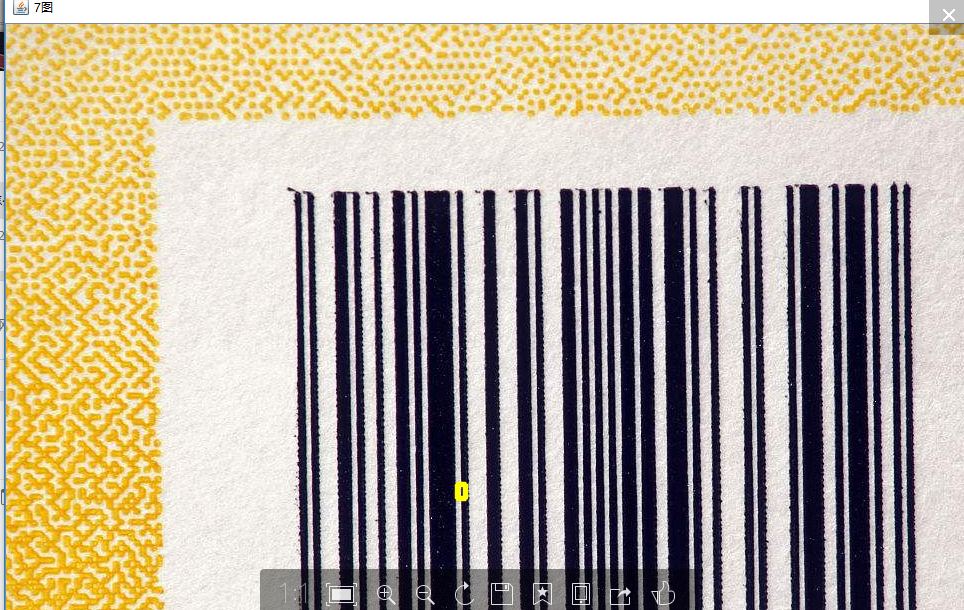java openCV 识别条形码

我在尝试使用java openCV 识别条形码。在花边框时却这样。
我初步判断是,计算面积出现问题。

System.out.println("Welcome to OpenCV "+Core.VERSION);
Mat m = new Mat(5,10, CvType.CV_8UC1,new Scalar(0));
System.out.println("OpenCV:"+m);
Mat srcImage = Imgcodecs.imread("C:\\Users\\13543\\Desktop\\timg.jpg");//原始
Mat grayImage = new Mat();//灰色
Mat gradientXImage = new Mat();
Mat gradientYImage = new Mat();
Mat gradientImage = new Mat();
Mat blurImage = new Mat();//降噪图
Mat thresholdImage = new Mat();
Mat morphImage = new Mat();
Mat resultFileNameSring = new Mat();
ImageViewer imageViewer = new ImageViewer(srcImage, "原图");
imageViewer.imshow();
if(srcImage.empty()){
System.out.println("image file read error");
return;
}
//图片转为灰度图片
if(srcImage.channels()==3){
Imgproc.cvtColor(srcImage,grayImage,Imgproc.COLOR_RGB2GRAY);
}else{
grayImage = srcImage.clone();
}
new ImageViewer(grayImage, "灰色图").imshow();
//建立图像的梯度幅值(滤波器)
Imgproc.Scharr(grayImage,gradientXImage,CvType.CV_32F,1,0);
Imgproc.Scharr(grayImage,gradientYImage,CvType.CV_32F,0,1);
//因为我们需要的条形码在需要X方向水平,所以更多的关注X方向的梯度幅值,而省略掉Y方向的梯度幅值
Core.subtract(gradientXImage,gradientYImage,gradientImage);
//归一化为八位图像
Core.convertScaleAbs(gradientImage,gradientImage);
//看看得到的梯度图像是什么样子
new ImageViewer(gradientImage, "3图").imshow();
//对图片进行相应的模糊化,使一些噪点消除
Imgproc.blur(gradientImage,blurImage,new Size(9,9));
//模糊化以后进行阈值化,得到到对应的黑白二值化图像,二值化的阈值可以根据实际情况调整
Imgproc.threshold(blurImage,thresholdImage,210,255,Imgproc.THRESH_BINARY);
//看看二值化图像
new ImageViewer(thresholdImage, "4图").imshow();
//二值化以后的图像,条形码之间的黑白没有连接起来,就要进行形态学运算,消除缝隙,相当于小型的黑洞,选择闭运算
//因为是长条之间的缝隙,所以需要选择宽度大于长度
Mat kernel = Imgproc.getStructuringElement(MORPH_RECT,new Size(21,7));
Imgproc.morphologyEx(thresholdImage,morphImage,MORPH_CLOSE,kernel);
//看看形态学操作以后的图像
new ImageViewer(morphImage, "5图").imshow();
//现在要让条形码区域连接在一起,所以选择膨胀腐蚀,而且为了保持图形大小基本不变,应该使用相同次数的膨胀腐蚀
//先腐蚀,让其他区域的亮的地方变少最好是消除,然后膨胀回来,消除干扰,迭代次数根据实际情况选择
Imgproc.erode(morphImage,morphImage,Imgproc.getStructuringElement(MORPH_RECT,new Size(3,3)),new Point(-1,-1),4);
Imgproc.dilate(morphImage,morphImage,Imgproc.getStructuringElement(MORPH_RECT,new Size(3,3)),new Point(-1,-1),4);
//看看形态学操作以后的图像
new ImageViewer(morphImage, "6图").imshow();
List<MatOfPoint> contours = new ArrayList<MatOfPoint>();
List<Double> contourArea = new ArrayList<Double>();
Mat hierarchy = new Mat();
//接下来对目标轮廓进行查找,目标是为了计算图像面积
Imgproc.findContours(morphImage,contours,hierarchy,Imgproc.RETR_EXTERNAL,Imgproc.CHAIN_APPROX_SIMPLE);System.out.println("============"+contours.size());
//计算轮廓的面积并且存放
for(int i = 0; i < contours.size();i++)
{
contourArea.add(Imgproc.contourArea(contours.get(i)));
}
//找出面积最大的轮廓
Double maxValue;Point maxLoc;
Core.MinMaxLocResult minMaxLocResult = Core.minMaxLoc(morphImage);
// minMaxLoc(contourArea, NULL,&maxValue,NULL,&maxLoc);
// minMaxLoc()
// Core.MinMaxLocResult
// Core.MinMaxLocResult minMaxLocResult = Core.minMaxLoc(morphImage,morphImage);//Core.minMaxLoc(morphImage);
maxValue = minMaxLocResult.maxVal;
maxLoc = minMaxLocResult.maxLoc;
System.out.println("x:"+maxLoc.x+" y:"+maxLoc.y+" maxVal:"+maxValue);
//
// System.out.println("*********Start*******");
List<MatOfPoint2f> newContours = new ArrayList<>();
for(MatOfPoint point : contours) {
MatOfPoint2f newPoint = new MatOfPoint2f(point.toArray());
newContours.add(newPoint);
}
/计算面积最大的轮廓的最小的外包矩形
//// MatOfPoint2f m2f = (MatOfPoint2f) contours.get((int)maxLoc.x);
RotatedRect minRect = minAreaRect(newContours.get((int)maxLoc.x));
//
//
//
//
//
// //为了防止找错,要检查这个矩形的偏斜角度不能超标
// //如果超标,那就是没找到
if(minRect.angle<2.0){
//找到了矩形的角度,但是这是一个旋转矩形,所以还要重新获得一个外包最小矩形
Rect myRect = boundingRect(newContours.get((int)maxLoc.x));
// //把这个矩形在源图像中画出来
rectangle(srcImage,myRect,new Scalar(0,255,255),3,LINE_AA);
// //把这个矩形在源图像中画出来
new ImageViewer(srcImage, "7图").imshow();
}









